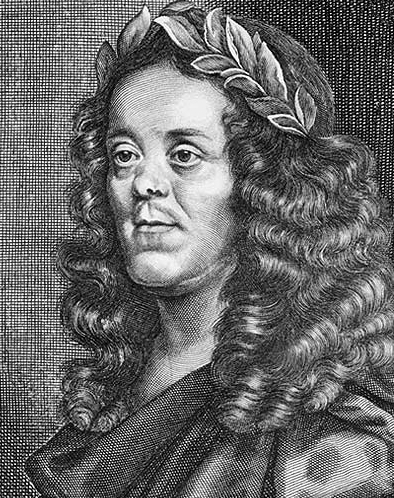Sir William D’Avenant (William D'Avenant)

Poet, Dramatist. Born at Oxford, England the second son of John D’Avenant, a prosperous vintner and proprietor of an inn known as the Crown. Reportedly his god-father was William Shakespeare. He attended All Saints and Lincoln College, Oxford. He left school before obtaining a degree to serve as a page to Frances, Duchess of Richmond and was afterwards taken into the service of the 1st Baron Brooke of Beauchamps Court whom he served until Brooke was murdered by his servant in 1628. He then turned to the theatre, producing his first play, the tragedy of “Albovine,” in 1629. He followed it with another tragedy, “The Cruel Brother” the following year. By 1637, his several plays had served to ingratiated him at court and on the death of Ben Jonson he was granted the office of poet laureate. In 1639 he became manager of a new theatre in Drury Lane. The Civil War, however, erupted and he became a royaltist supporter. In 1642, he was accused before the Long Parliament and imprisoned for two months in London; upon his relaese he fled to France. He volunteered to carry military stores for the Royalist army in England, and after the siege of Gloucester in 1643, he was knighted by Charles I in 1643. Upon his return to Paris, he converted to Roman Catholicism and served Queen Henrietta Maria while apparently composing an epic poem, “Gondibert.” With the Restoration, he opened a new theatre in Lincoln’s Inn Fields called The Duke’s. His last work was a pillaging of Shakespeare’s “Tempest” and it was rumored at one time that he was the author’s biological son but the rumor was without substance. He died at his house in Lincoln’s Inn Fields at about age 62 and was interred in Poets’ Corner, Westminster Abbey, under the epitaph “O rare Sir William Davenant!” His body of work consists of the unfinished epic poem of fifteen hundred stanzas, some shorter poems, and almost thirty plays. Modern scholars generally regard his work as no better than mediocre, both dull and stilted, though apparently considered decorous and moral in his time. (bio by: Iola)
Born
- January, 01, 1970
- England
Died
- April, 04, 1668
- England
Cemetery
- Westminster Abbey
- England

